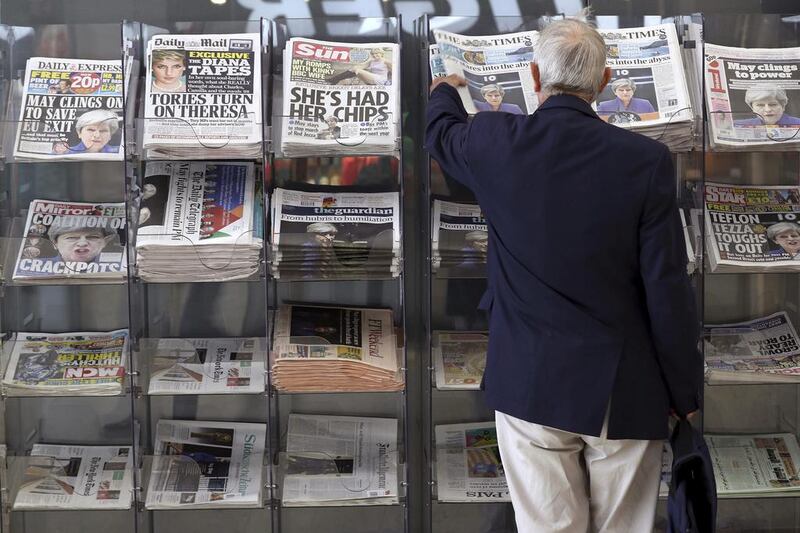An election called to give the UK more clarity about the future has done the exact opposite, leaving investors with UK financial interests in a state of limbo.
“We could see a fair amount of volatility in the coming days and weeks unless Westminster’s response to this surprise result is remarkably smooth, which is unlikely,” said Lucy O’Carroll, chief economist at Aberdeen Asset Management, which has an office in Abu Dhabi Global Market.
The British currency dropped by 1.6 per cent against the dollar through the session to end the week at US$1.2746, having hit an eight-month high above $1.30 in mid-May when it still seemed that prime minister Theresa May’s Conservative government would romp home with a much bigger cushion than the 12-seat working majority she had when she called the snap election in mid-April.
“The British pound had a rough night [on Thursday] and we have experienced many whipsaws due to the uncertainty which we are facing now,” said Naeem Aslam, chief market analyst at online brokers ThinkMarkets, who added that a hung parliament only adds “more fuel to this volatility”.
The uncertainty includes the question of whether the Conservatives – and Mrs May herself – can stay in power. The Conservatives won 318 seats, eight short of the 326 needed for a bare majority, and Mrs May announced that she intended to form a government with the Democratic Unionist Party (DUP) of Northern Ireland, which won 10 seats.
But the Daily Telegraph reported on Saturday that a petition calling for that deal to be blocked and for Mrs May to resign had received more than 500,000 signatures. The DUP's religiously ultra-conservative views are anathema to many across mainland Britain's political spectrum.
Another uncertainty for a Tory/DUP government is the future of the UK’s crucial negotiations over its exit from the European Union (EU). Brexit talks are due to begin in just over a week, but the Tories and DUP have very different views on the issue. Mrs May had expected to have a firmer position from which to negotiate a “hard Brexit” position – ie, a complete severing of the relationship.
But Arlene Foster, the DUP leader, wants a softer Brexit that would leave the border with the Republic of Ireland open and favourable trading terms with the EU in place.
“History tells us that hung parliaments are not durable, let alone with Brexit looming large,” said Ms O’Carroll. “A request to pause the Brexit negotiations may be one possibility, but it’s not clear how that would work as there’s no precedent. Either way, this result looks to strengthen Europe’s hand in the negotiations.”
The pound’s fall against the euro started a month ago and has been sharper than against the dollar, losing 5 per cent from the time the election was called to Friday, when it dropped another 1.45 per cent to €1.1383.
It has not all been doom and gloom for investors with UK interests. The FTSE 100 index has kept pace with the Euro Stoxx 50 for the past year, with both up about 23 per cent. Over the past month, the FTSE 100 has gained nearly 2 per cent, while the EuroStoxx has dropped 1.64 per cent. The FTSE 100 has also done better than the S&P 500 in the US, which has its own political turmoil to contend with. The S&P index is up just 16 per cent over the year and 1.34 per cent on the month.
“There is a school of thought that a hung parliament may lead to a softer outcome in the Brexit talks,” said Richard Carter, head of bond strategy at Quilter Cheviot investment advisers, which has a Dubai International Financial Centre office. But, he added that, “negotiations with the EU will be made much more complicated by this result, with the possibility that another election may even be necessary”.
He advised investors to adopt a wide geographical diversity. “Given the backdrop of solid global growth, [we retain] a preference for overseas equities over UK equities, and [are] underweight gilts,” Mr Carter said. “We have a sizeable exposure to overseas earners on the FTSE 100, and a meaningful position in gold, in part due to geopolitical uncertainty.”
For expatriate investors in the UAE, the advice from Sam Instone, chief executive of Dubai-based advisers AES International, is not to panic. “Last year it was the election of [US president Donald] Trump, then it was Brexit and now it’s the UK elections,” he said. “No one can ever tell which way foreign currency or equities will move and whenever people try to guess, it often goes the other way.”
amcauley@thenational.ae
Follow The National's Business section on Twitter





